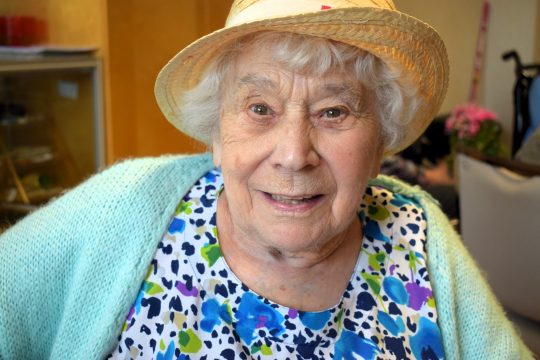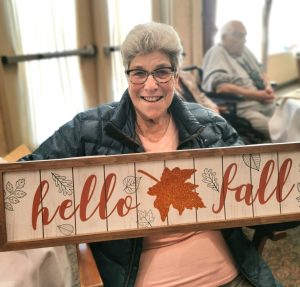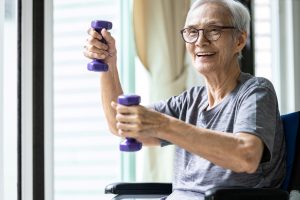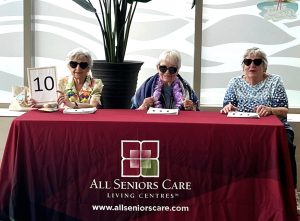
Slips, trips, falls. No matter what you call them, stumbles can happen to anyone.
Yet they become more and more common as we get older. Falls remain the leading cause of injury-related hospitalizations among Canadian seniors with approximately 25% of individuals aged 65 and older falling every year. Most falls occur in people over 74 years old. This makes falls a major health concern for older Canadians.
Keep reading to learn simple steps you can take to prevent falls and maintain your independence.
Why Simple Tips to Prevent Falls is Important
 Most falls can be prevented, and a person’s risk of injury reduced. With motivation, healthy habits and an awareness of how to reduce risk, we can all play our part in preventing older people from having a fall.
Most falls can be prevented, and a person’s risk of injury reduced. With motivation, healthy habits and an awareness of how to reduce risk, we can all play our part in preventing older people from having a fall.
Even when falls don’t cause an injury, they often trigger a loss of confidence and lead to an ongoing fear of falling. Over time, the person may limit or reduce their activity level, which further increases the risk of falling.
The first step to avoiding falls is to understand what causes them. Falls may occur due to:
- decreased bone and muscle strength,
- vision or hearing loss,
- poor balance or gait problems,
- medical conditions that can cause fatigue, dizziness, weakness,
- chronic foot problems.
With peak fall times between 6 a.m. and noon – or in early evening when light is low -what started as a typical day can set off a domino effect that leads to loss of independence.
How To Prevent Falls and Maintain Independence
The good news is that falls can be prevented. To stay safe and on your feet take these steps to protect yourself.
1. Fall Proof Your Home
Whether it’s slippery floors, rickety stairs, or electrical cords, some of the most common causes of falls are in the home where you might have a false sense of security. That’s why fall prevention starts with creating a safe living space.
Handrails, grab bars in washrooms, better lighting, and fewer tripping hazards are all proven ways to prevent falls:
- Keep stairs and walkways free of clutter, ice, or snow.
- Use handrails and grab bars to keep you steady on your feet.
- Stop and smell the roses: take your time, don’t rush when walking or getting up.
- Light up your life…and your hallways, stairs, and walkways.
But don’t stop there. Click on the link for a home safety checklist from the Winnipeg Regional Health Authority to assess whether your home is fall proof.
For those already living in an age-friendly community like an All Seniors Care senior home, you know it’s the little things that count! From automatic doors to walkways that are cleared year-round and a keen eye for potential problem areas mean that our residences help seniors live safely, enjoy good health and stay involved.
2. Exercise to Prevent Falls
 It sounds counterintuitive, but it’s true. Regular physical activity and exercise will increase muscle strength and improve co-ordination so that you can maintain your independence. Also, the more you move and build strength, balance, and flexibility, the less likely you are to injure yourself in a fall.
It sounds counterintuitive, but it’s true. Regular physical activity and exercise will increase muscle strength and improve co-ordination so that you can maintain your independence. Also, the more you move and build strength, balance, and flexibility, the less likely you are to injure yourself in a fall.
Research shows that one of the best activities to help keep you on your feet is Pilates. T’ai Chi is also a great choice. At All Seniors Care, seated and standing exercises, dancing, and daily walks help keep older adults active!
3. Put Your Best Foot Forward
Put your best foot forward in well-fitting, sturdy shoes, both indoors and out. Shoes with high heels, slippery soles, those that don’t fit properly, or not tying laces securely can all cause you to lose your balance or trip and fall. Foot problems may also affect your balance and change the way you walk, putting you at a greater risk. For more information on choosing footwear, read Proper Footwear Can Prevent Falls.
4. Annual Eye Exams Prevent Falls
Seniors with low vision are 2.5 times more likely to fall than those without it. Although there are many factors that can cause a fall, vision loss is often the primary cause.
An essential piece of the falls prevention puzzle, even the smallest change in a person’s vision can increase the risk of a fall, especially in older adults. As the eye ages, vision sharpness decreases and adaptation to low light slows. Other changes are an inability to distinguish between shades and problems with glare.
Age-related vision conditions such as cataracts, macular degeneration, glaucoma, and diabetic retinopathy – or simply not prescribed wearing glasses – can prevent seniors from seeing objects in their way and lead to falls. Compounding the issue, vision loss is linked to decreased physical activity.
Remember, along with preventing falls, annual eye exams are crucial for preserving sight and protecting overall health.
5. Eat a Balanced Diet
 Eating healthy foods is important for your overall health and wellbeing, but it can also help to prevent falls. Eating regular, nutritious meals and drinking plenty of non-alcoholic fluids can help to avoid problems that can contribute to a fall, including light-headedness and dehydration.
Eating healthy foods is important for your overall health and wellbeing, but it can also help to prevent falls. Eating regular, nutritious meals and drinking plenty of non-alcoholic fluids can help to avoid problems that can contribute to a fall, including light-headedness and dehydration.
Also, nutrition is a determining factor in not only the severity of injuries from falls, but also recovery time after an injury. This is just one of the reasons that ASC retirement residences focus on providing delicious, nutritious meals prepared by in-house chefs.
6. Gait Aids Help with Balance
Assistive devices like canes, walkers, handrails, and grab bars help prevent falls while hip protectors reduce the risk of injury. Individuals with balance and mobility problems are encouraged to use prescribed assistive devices for daily activities.
7. Manage Your Health to Reduce Falls Risk
Several chronic conditions are associated with the higher prevalence of falling, including Parkinson’s disease, heart failure, cognitive impairments, diabetes, and arthritis. Older adults are also at an increased risk for falls and fall-related injuries if:
- Taking four or more medications daily, prescribed and/or over the counter.
- Taking heart or blood pressure medications.
- Taking medications to help with sleep or to calm nerves, such as sedatives.
To prevent falls in older people who live with chronic diseases, care must be well-coordinated and monitored by healthcare providers. Whether an older adults lives in an Independent Senior Apartment or home, or in Assisted Living, having caring professionals on-hand to help when needed goes a long way towards keeping them on their feet.
Falls Prevention Made Fun at All Seniors Care
During Falls Prevention Month and year-round, our senior living centers are dedicated to keeping you and your loved ones safe. To make it fun, we created Cinnamon Roll into Fall Prevention education sessions. Residences like College Park retirement home Regina and our Ottawa senior care homes apartments made cinnamon buns while talking falls prevention!
Falls can be frightening, especially when you’re home alone. At All Seniors Care, where we place a high value on health, happiness, and overall wellbeing, seniors are never truly alone. Whether you’re interested in a retirement residence in Alberta, Manitoba, Ontario, Saskatchewan or Quebec, give us a call at your convenience and we’ll be happy to chat about how we are helping to significantly lower your loved one’s risk of falling.
Our retirement residences in Canada support both healthy seniors and those requiring assistance. Our client-centred approach ensures that seniors needing extra support are identified early. For example, ensuring eye and dental visits are up to date, putting strategies in place to reduce the risk of falls in suites, having the right assistive devices and footwear, making sure medication is taken as prescribed, and monitoring weight, nutrition, and hydration.
Originally published November 18, 2021. Modified November 24, 2023.
Writer – Julianna McLeod
Julianna is a health and wellness expert at All Seniors Care. Her mission is to create content that empowers older adults to form sustainable solutions for lasting health and happiness. She is an experienced writer, editor, and Recreational Therapist living in Toronto.

